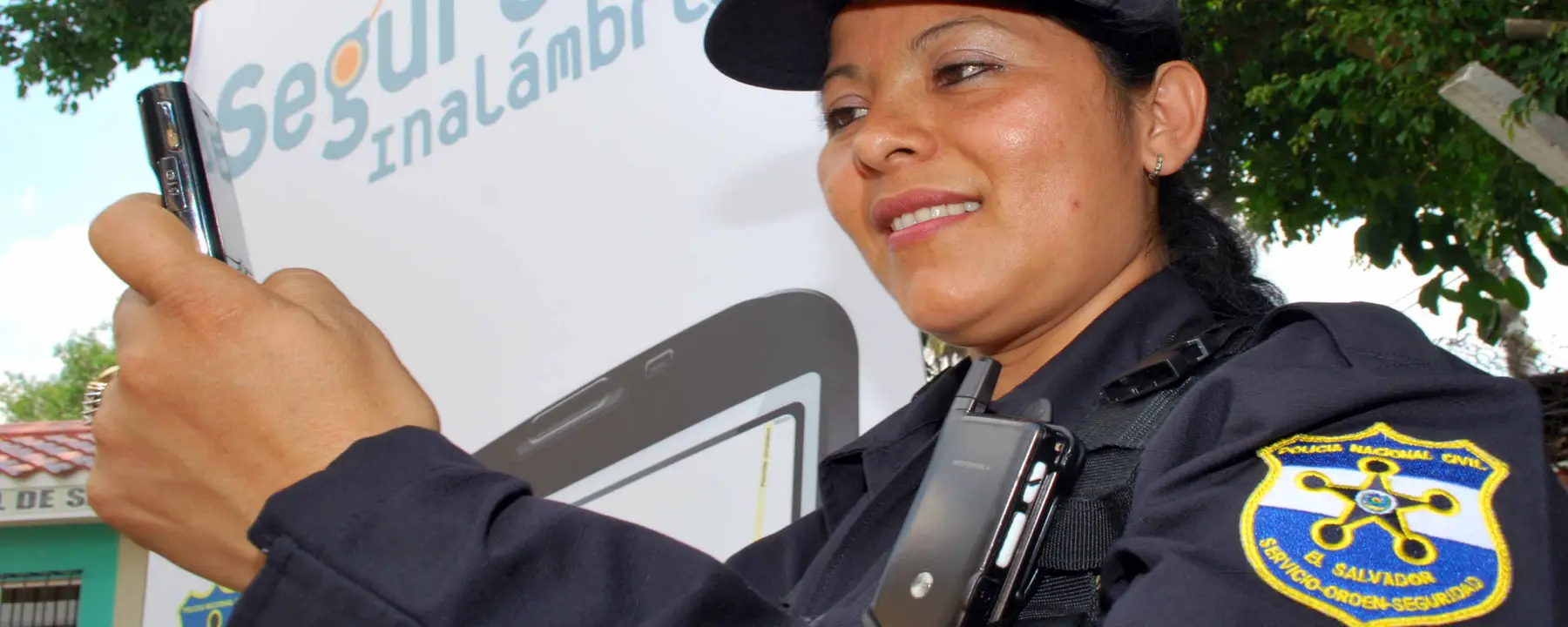Empowering law enforcement agencies in El Salvador with open source mobile technology for standardized crime reporting
El Salvador suffers from high levels of crime and violence that undermine citizen security, impede economic development, and erode good governance. In 2009 El Salvador had one of the highest homicide rates in the world, and gang activity, violent crime, and petty crime remain prevalent throughout the country.
National and local governments in El Salvador share responsibility for preventing and responding to crime and violence. Their objectives include reducing the spread of crime, identifying contributing factors, and developing effective crime and violence prevention strategies.
Effective coordination across jurisdictions, however, requires standardized processes for collecting, analyzing, and sharing data.
Integrating Mobile Data Collection with Web-Based Mapping and GIS Analysis
In 2009, RTI joined Qualcomm Wireless Reach™, the U.S. Agency for International Development (USAID), Millicom/Tigo El Salvador, and local government agencies in San Salvador to develop a mobile crime reporting system dubbed Seguridad Inalámbrica or Wireless Security.
At the time, only four municipalities in El Salvador—Santa Tecla, Santa Ana, Ahuachapa, and San Martin—were able to map the incidence of crime, and three were doing so manually. This manual approach to data collection and processing was slow and labor intensive, and the system did not guard against data entry and geocoding errors. Municipal government agencies lacked accurate on-demand maps needed to adjust law enforcement tactics and resources or to plan and monitor community development interventions aimed at reducing crime.
The city of San Salvador sought a solution to gather crime-related data quickly, share it between agencies, and deliver it to the city's Crime Observatory for analysis and reporting to the mayor.
Secure, Open Source Solution Developed with Input from Law Enforcement Officers
RTI, with funding from Qualcomm Inc., developed a system integrating mobile data collection with web-based mapping, and advanced GIS-based analysis. The Seguridad Inalámbrica (Wireless Security) system developed by our experts allowed national and municipal police to
- Gather information from the field using smart phones
- Seamlessly add geographical information to each reported event
- Transmit data back to a central database for review and analysis by participating agencies.
Seguridad Inalámbrica combines the open source Ushahidi software with a sophisticated GIS system and a complete API that is easy to adapt to other analysis and reporting applications.
Using an iterative approach that integrated feedback gathered during hands-on training sessions with officers, we developed a simple, multilingual, and fully configurable data-entry application for 3G mobile phones. Our app allows law enforcement officers to quickly enter and submit crime incident data—including geographical information and photos—remotely, and synchronize on demand with the central data repository. Reported events are classified based on categories that closely match the legal categorization for criminal and regulatory offenses.
The Seguridad Inalámbrica system displays crime report data on detailed maps of the city. A timeline plots events in each category, and agency users can select overlays such as patrol areas set by the national police for real-time analysis. This enables agencies to identify high-risk locations, track patterns and trends in crime, and evaluate the effectiveness of crime and violence prevention programs.
Law enforcement officers can also receive information from other officers via their mobile phones.
Data transmissions from mobile phone handsets and all communication with the website are protected by Secure Socket Layer (SSL) technology and unique API keys. This keeps unauthorized or rogue users from accessing the system remotely, and enables agencies to keep a lost or stolen unit from submitting data.
Enhancing Public Safety Through Wireless Technology
After a successful pilot of the Seguridad Inalámbrica system in Santa Tecla from 2010 through 2012, RTI supported the expansion of the system across San Salvador. The Corps of Metropolitan Agents, the National Civilian Police, and observatories in six municipalities connected to mobile and web-based crime mapping and reporting databases—giving them immediate access to data that used to be reported only monthly.
Nearly 600 law enforcement agents were trained to use the system and submitted more than 11,000 incident reports.
As shown in a 2014 evaluation of the system, these data enabled municipalities to inform deployment of law enforcement resources and improve crime prevention programs. For example, San Salvador increased combined municipal and national police patrols in hot spots based on locations and times identified by Seguridad Inalámbrica data.
Our team’s commitment to using open source software helps to make Seguridad Inalámbrica a locally sustainable solution—one that could be scaled to national coverage or adapted for use in other countries to enable law enforcement agencies around the world protect and serve their citizens.
- Qualcomm
- Inc.
- Planning Office of the San Salvador Metropolitan Area
- National Civil Police
- Municipal Observatory for Prevention of Violence
- Millicom/Tigo El Salvador
- U.S. Agency for International Development
- United Nations Development Programme (UNDP)

